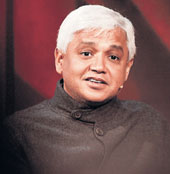 |
For art’s sake
Wordsmith Amitav Ghosh is no mincer of words. The other day, a petition to the President, urging that artist Maqbool Fida Husain be awarded the Bharat Ratna, was sent to the New York-based writer. The petition, signed among others by artists Tyeb Mehta, Ram Kumar, A. Ramachandran, K.G. Subramanyan, Jogen Chowdhury, Laxma Goud and Paritosh Sen, filmmakers Shyam Benegal and Mira Nair, theatre activist Ebrahim Alkazi and academics Amiya Bagchi and Irfan Habib, appealed to the President to honour Husain, hounded out of India by fire-spewing fundamentalists. “Posterity,” said the letter, “will certainly name Husain as one of the most prominent post-Independence artists to shape the contemporary in the spirit of a living and changing tradition”. But Ghosh disagreed. Husain, he argued, deserved all the support that could be mustered for his homecoming, but in his opinion he didn’t merit the Bharat Ratna. The petition, with its long list of luminaries, has been sent to the President, and, no, Ghosh’s much-admired signature is not there.
Wild at heart
Say young Indian-American and you immediately conjure up a picture of a spelling bee winner, or a successful software engineer. But a young woman called Tasneem Nanji has chalked out a path that’s vastly different from the one that most Indians tread on. Nanji, who was born in Uganda, was kicked when the family was kicked out to Kenya and then moved to New York. She studied like any good Indian kid — but ended up getting a bachelor’s degree in jazz performance. She is now a part of a band called Jungli. The group is called Jungli because that’s what her mom called her, says Tasneem in online magazine Ego. Her music, however, is anything but that.
India connection
Don’t ever say Pereira dos Santos, who? For dos Santos is to Brazil what Mrinal Sen is to Calcutta, says a beaming Antonio Urano, a Brazilian film distributor who is in Calcutta to promote his film Brasilia 18%. Urano, who is all praise for Calcutta’s ‘mature’ cinema-going audience, says the film is about a journalist breaking into a cordon of political corruption. It is a film that Indians may relate to. There is, after all, quite a lot that’s common to the two countries: a multicultural society, love for music and amazing nature. And, then, as in Brazil, corruption is often a synonym for politics in India.
 |
The right choice
Sixty-five years after his demise, Nobel laureate Rabindranath Tagore is suddenly making headlines once again. Going by a compilation of poetry that was released in New Delhi earlier this week, a full dozen out of a chosen group of 91 Indian celebrities consider his poem Where the Mind is without Fear their favourite piece of verse. The book, titled A Poem for Cry and worked on jointly by publishers Penguin and NGO Child Relief and You, gets the celebrities — including Shabana Azmi, Anjolie Ela Menon, Amartya Sen, Baba Amte, Soli Sorabjee and Jyotiraditya Scindia — to introduce their favourite poems, and talk about why their chosen lines have left a lasting impression in their minds. While Tagore emerges a clear favourite, Rudyard Kipling (for If) and Robert Frost (for The Road not Taken) follow, though not quite closely behind.
Clearly, in these turbulent times, Tagore still seems to be inspiring many to hold their heads high. And here is Modern India, thinking that holding your head high is what a model needs to do on the ramp.
 |
Feel-good factor
Boman Irani is all smiles after his recent trip to the United States to attend the screening of Lage Raho Munnabhai at the United Nations. After UN under secretary general Shashi Tharoor introduced the film, the audience laughed and cried as the subtitles rolled. “This was one film about feeling good and not about making money,” Irani has been quoted as saying. But what about the fact that he was the baddie in the film? “No one can be 100 per cent bad,” says Irani. That’s Gandhigiri made-easy for you.










